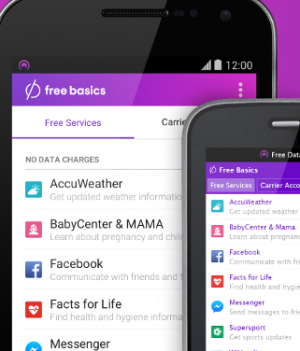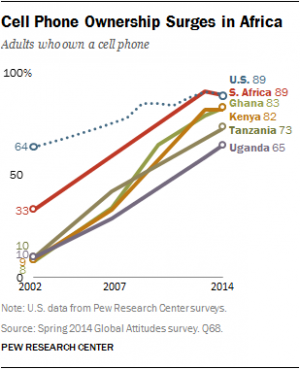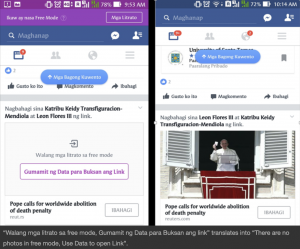Free Basics
|
Free Basics is a worldwide program pioneered by Facebook in an effort to provide underdeveloped regions access to a restricted set of Internet services. It was founded in 2013 as Internet.org and was later renamed Free Basics, which is now a project under the umbrella of Internet.org [1]. Through a mobile browser or an Android app, participants are given free access to participating sites completely free of charge[2]. The platform has enabled over 25 million people in 63 countries to access the Internet to date.
History
Reasoning and Mission
In 2012, Internet accessibility in Africa was around 15.5% according to a conducted across a sample of 12 countries on the continent [3]. At the same time, cell phone ownership was on the rise (figure). Facebook viewed this as an opportunity to bring millions online and “bridge the accessibility gap.” [4].
In his paper where he explained why he thought Free Basics was needed, Zuckerberg estimated that around two-thirds of the world population does not connect with the Internet. Furthermore, the reason is not that they can not achieve access, but that they cannot afford it. Zuckerberg believes Internet access is a human right with the power to help lift people out of poverty. [5]
To bring them online, Facebook made partnerships with phone carriers in the target regions who allow them to provide the free access to between 200-450 services. [6] These services include Facebook, world news, job search sites and other educational information that can be used to make more informed decisions.
Internet.org and Rebranding
Internet.org was created by Facebook to work towards bringing everyone in the world online under the assumption that accessibility is a human right and can help improve the quality of lives. Internet.org started with the program that is now known as Free Basics. However, as time progressed they developed more programs to help achieve their goal. One such program launched in 2014. The Connectivity Lab is working to bring people online by developing drones and other advanced technologies that can bring internet access to communities around the world.
In 2015, the Internet.org application was rebranded as Free Basics in an effort to clarify what it was doing and differentiate it from the rest of Internet.org. It is now only a part of Internet.org. Zuckerberg clarified that the goal of Free Basics is to bring people who cannot afford traditional access online. It does so by providing just the basics, and does not claim to be an equitable experience to paid Internet. This clarification came among backlash that the limited access may be in violation of Net Neutrality. [7]
Users
How to get Free Basics
In order to gain access to Free Basics, users must have a SIM card from one of the participating mobile operators in a region where Free Basics has launched. Business owners that want their website or application to be a part of Free Basics must adhere to technical guidelines provided by Facebook and submit it for review.[8]
Where you can get Free Basics
As of 2018, Free Basics is available in the following countries: [9]
Europe, Africa & Middle East
- Algeria (Oordeoo)
- Angola (Movicel)
- Belarus (Life)
- Benin (MTN & Etisalat)
- Cape Verde (Unitel & CVMovel)
- Chad (Tigo)
- Congo (Airtel)
- Côte D’ivoire (MTN)
- Democratic Republic of the Congo (Airtel & Vodacom)
- Gabon (Airtel)
- Ghana (Airtel & Tigo)
- Guinea (Cellcom)
- Guinea-Bissau (MTN)
- Iraq (AsiaCell, Korek & Zain)
- Jordan (Zain & Umniah)
- Kenya (Airtel)
- Liberia (Orange)
- Madagascar (Orange & Blueline)
- Malawi (Airtel & TNM)
- Mauritania (Mauritel)
- Mozambique (Mcel)
- Niger (Airtel)
- Nigeria (Airtel & 9 Mobile)
- Rwanda (Airtel & Tigo)
- Senegal (Tigo)
- Seychelles (Airtel)
- South Africa (Cell C)
- Sudan (Zain)
- Tanzania (Tigo, Airtel & Vodacom)
- Togo (Moov)
- Zambia (Airtel & MTN)
Asia Pacific
- Bangladesh (Grameenphone & Robi)
- Cambodia (Smart Axiata)
- Indonesia (Indosat, XL Axiata)
- Maldives (Ooredoo)
- Mongolia (G-Mobile, Mobicom & Skytel)
- Pakistan (Telenor & Zong)
- Philippines (Globe & Smart)
- Thailand (DTAC & TrueMove)
- Timor-Leste (Telkomcel)
- Vanuatu (Telecom)
- Vietnam (Mobifone)
Latin America
- Antigua and Barbuda (Digicel)
- Aruba (Digicel)
- Barbados (Digicel)
- British Virgin Islands (Digicel)
- Bonaire (Digicel)
- Colombia (Tigo)
- Curaçao (Digicel)
- Dominica (Digicel)
- Dominican Republic (Orange)
- Grenada (Digicel)
- Guatemala (Tigo)
- Honduras (Tigo)
- Jamaica (Digicel)
- Mexico (Telcel & Virgin)
- Montserrat (Digicel)
- Panama (Digicel)
- Peru (Bitel & Entel)
- Saint Kitts and Nevis (Digicel)
- Saint Vincent & the Grenadines (Digicel)
- Suriname (Digicel)
- Turks and Caicos (Digicel)
Backlash and Ethical Issues
Net Neutrality in India
After launching Free Basics, in various regions, Facebook faced backlash. The primary point of contention was that Free Basics violated Net Neutrality principles. Net Neutrality asserts that all services and sites on the "net" should be treated equally by providers.[10] The goal of Net Neutrality is to preserve competition and prevent providers from favoring particular sites in order to maximize profits.
This issue was shot into the spotlight soon after Facebook launched Free Basics in India in 2014. Indian activists declared that Free Basics created differential pricing for particular sites in that those that they approved were free and others had to be paid for which went agains Net Neutrality principles. [11] Zuckerberg was furthermore coined as a "digital colonialist," insinuating that he was imposing and publicizing the "right" to free internet as a method of masking his true motive of profit. [12] Facebook as a company has proclaimed in support of net neutrality, but countries like India and others argue that Free Basics stands in contradiction of that position. The debate continued in India and was ended in 2016 when India's telecom regulator officially banned differential pricing for different services and kinds of data.The reasoning provided for this move was that if they allowed Facebook (or other potential violators) to decide what services to offer the portion of the population that remains offline, they are allowing Facebook to shape their Internet experience which is inherently unfair and in violation of Net Neutrality. [13] They ruled in favor of a free and open net.
Free Basics in the Philippines
With the introduction of Facebook Free Basics in 2015 and the utilization of Facebook during the 2016 Philippine Presidential Elections, ethical concerns have been raised as the platform has become a source for misinformation in the Philippines and criticized as becoming a weapon for the government against opposition.[14] Free Basics is incredibly popular in the Philippines, and Facebook is essentially the country's Internet, coming pre-loaded onto phones with limited functionality. Yet because one can only read headlines in this free version of the internet, there is no way to verify the information one consumes.[15]
Ethics
Embedded Values
Free Basics is a platform that brings partial Internet access to millions of people who cannot afford it. The intention of the platform is altruistic in nature, but their are considerations beyond intent. Brey argues that computer systems and softwares cannot be morally neutral, they have embedded values that can advocate certain points of view. [16] In the case of Free Basics, Facebook chooses what sites qualify to be included. As such, Facebook's preferences will be embedded into the program and can as a result affect the experience of users. The users' online experience will give them the ability to learn about the what is happening around the world through the lens of what Facebook deems worthy and appropriate.
It is important to note that Facebook claims rejections are not made on the basis of their community guidelines, rather they are focused on technical specifications. [17] However, Facebook seeks out many of the participating sites to make deals so that Free Basics is valuable. They are thus embedding their bias into Free Basics.
Furthermore, embedded values are not always evident in the transparent practices of a company or product. As such, disclosive ethics aims to reveal and analyze practices that may create ethical problems. [18] In this case, it is likely that in addition to values embedded by a subjective review process, emergent bias is embedded into Free Basics. Emergent Bias is bias that hinges on the context of use and the interaction between the user and the program. Free Basics was created for the lower income, under-served population of the world. As such, technology literacy is likely lower and Free Basics does not necessarily account for that. Facebook requires efficient and compatible services, but they do not require help sections and they only provide minimal support.
References
- ↑ “Free Basics by Facebook – English.” English, 12 Oct. 2016, info.internet.org/en/story/free-basics-from-internet-org/.
- ↑ Siddharth Singh, Vedant Nanda, Rijurekha Sen, Sohaib Ahmad, Satadal Sengupta, Amreesh Phokeer, Zaid Ahmed Farooq, Taslim Arefin Khan, Ponnurangam Kumaraguru, Ihsan Ayyub Qazi, David Choffnes, and Krishna P. Gummadi. 2017. An Empirical Analysis of Facebook’s Free Basics Program. In Proceedings of ACM Sigmetrics conference, Urbana-Champaign,IL, USA, June 05-09, 2017 (SIGMETRICS ’17), 2 pages. https://doi.org/http://dx.doi.org/10.1145/3078505.3078554
- ↑ Stork, Christoph & Calandro, Enrico & Gillwald, Alison. (2013). Internet going mobile: Internet access and use in 11 African countries. Info - The journal of policy. 15. 10.1108/info-05-2013-0026.
- ↑ Siddharth Singh, Vedant Nanda, Rijurekha Sen, Sohaib Ahmad, Satadal Sengupta, Amreesh Phokeer, Zaid Ahmed Farooq, Taslim Arefin Khan, Ponnurangam Kumaraguru, Ihsan Ayyub Qazi, David Choffnes, and Krishna P. Gummadi. 2017. An Empirical Analysis of Facebook’s Free Basics Program. In Proceedings of ACM Sigmetrics conference, Urbana-Champaign,IL, USA, June 05-09, 2017 (SIGMETRICS ’17), 2 pages. https://doi.org/http://dx.doi.org/10.1145/3078505.3078554 .
- ↑ Hempel, Jessi. “Facebook Renames Its Controversial Internet.org App.” Wired, Conde Nast, 29 June 2017, www.wired.com/2015/09/facebook-renames-controversial-internet-org-app/.
- ↑ Siddharth Singh, Vedant Nanda, Rijurekha Sen, Sohaib Ahmad, Satadal Sengupta, Amreesh Phokeer, Zaid Ahmed Farooq, Taslim Arefin Khan, Ponnurangam Kumaraguru, Ihsan Ayyub Qazi, David Choffnes, and Krishna P. Gummadi. 2017. An Empirical Analysis of Facebook’s Free Basics Program. In Proceedings of ACM Sigmetrics conference, Urbana-Champaign,IL, USA, June 05-09, 2017 (SIGMETRICS ’17), 2 pages. https://doi.org/http://dx.doi.org/10.1145/3078505.3078554 .
- ↑ Mohan, Pavithra. “Facebook Rebrands Internet.Org App As ‘Free Basics.’” Fast Company, Fast Company, 25 Sept. 2015, www.fastcompany.com/3051576/facebook-rebrands-internetorg-app-as-free-basics.
- ↑ “FAQ - Free Basics - Documentation.” Facebook for Developers, developers.facebook.com/docs/internet-org/faq#howtouse.
- ↑ “Where We've Launched – English.” English, 25 Jan. 2018, info.internet.org/en/story/where-weve-launched/.
- ↑ Chung, Alex, and Chi Xing. “The Ethics of Net Neutrality.” DocPlayer, UCDavis, docplayer.net/29076932-The-ethics-of-net-neutrality.html.
- ↑ Tripuraneni, Hanuman Chowdary. “The Free Basics (of Facebook) Debate in India.” Info, vol. 18, no. 3, 2016, pp. 1–3., doi:10.1108/info-02-2016-0005.
- ↑ Shearlaw, Maeve. Facebook Lures Africa with free internet – but what is the hidden cost? The Guardian. August 1st 2016. https://www.theguardian.com/world/2016/aug/01/facebook-free-basics-internet-africa-mark-zuckerberg.
- ↑ Joshi, Sonam. “India Says Yes to Net Neutrality, No to Facebook's Free Basics.” Mashable, Mashable, 8 Feb. 2016, mashable.com/2016/02/08/india-bans-facebook-free-basics/#p3Ic_bgLPkqz.
- ↑ Etter, L. (2017). What Happens When the Government Uses Facebook as a Weapon? It’s social media in the age of “patriotic trolling” in the Philippines, where the government is waging a campaign to destroy a critic—with a little help from Facebook itself. Retrieved from https://www.bloomberg.com/news/features/2017-12-07/how-rodrigo-duterte-turned-facebook-into-a-weapon-with-a-little-help-from-facebook
- ↑ Palatino, M. (2017). Philippines: On Facebook's Free Version, Fake News is Even Harder to Spot. Retrieved from https://advox.globalvoices.org/2017/07/28/philippines-on-facebooks-free-version-fake-news-is-even-harder-to-spot/
- ↑ Brey, Philip A. E. 2012. “Anticipating Ethical Issues in Emerging IT.” Ethics and Information Technology 2012 [13 Pages]. Proposes a useful model of “anticipatory technology ethics.”
- ↑ “FAQ - Free Basics - Documentation.” Facebook for Developers, developers.facebook.com/docs/internet-org/faq#howtouse.
- ↑ Brey, Philip A. E. 2012. “Anticipating Ethical Issues in Emerging IT.” Ethics and Information Technology 2012 [13 Pages]. Proposes a useful model of “anticipatory technology ethics.”


